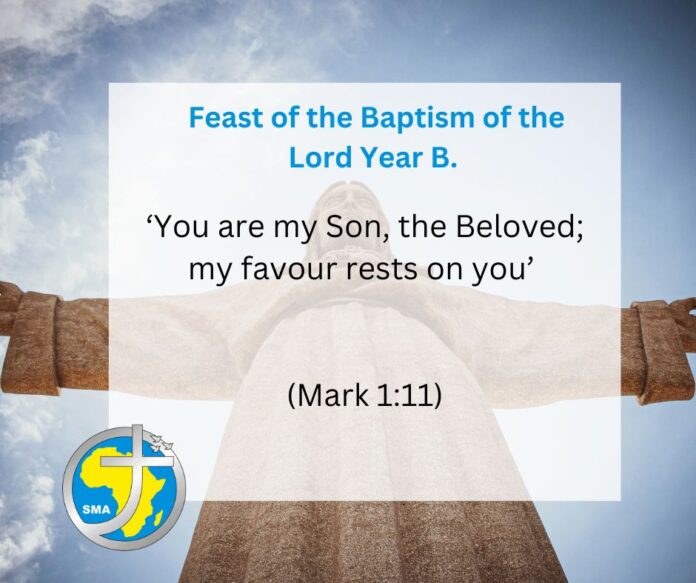Readings: Isaiah 50:1-11; 1 John 5:1-9; Mark 1:7-11
Theme: ‘You are my Son, the Beloved; my favour rests on you’ (Mark 1:11)
Today, we reach the end of the Christmas season, and come to the third great manifestation (‘epiphany’) of God in the person of Jesus. The first epiphany was at the birth of the child Jesus in a stable at Bethlehem, when he was visited and adored by shepherds, representing the poor and marginalized people of Israel. The second epiphany was when the wise men (magi) came from ‘the East’ to worship the baby Jesus, the new-born King. They represent all peoples and nations, who are invited to be numbered among God’s own people. Today, we celebrate the third great epiphany, the occasion of the baptism of Jesus by John, when He is revealed as God’s beloved Son.
The baptism of Jesus marks a major transition moment in his life. He is leaving behind the hidden years in Nazareth and entering the public arena for the first time. Hence, the focus of our liturgy shifts from the baby in the manger to the adult Jesus about to embark on his messianic mission. His first public act is to join with a group of his fellow Jews, listening to the preaching of his cousin, John, and accepting to be baptized by him in the Jordan river. At this time and in this place, Jesus is affirmed in his identity as God’s beloved Son: ‘No sooner had he come up out of the water than he saw the heavens torn apart and the Spirit, like a dove, descending on him. And a voice came from heaven, “You are my Son, the Beloved; my favour rests on you”’(Mk 1:11).
This affirmation of Jesus by his heavenly Father, his Abba, must have been a powerfully liberating experience for Jesus, preparing him for the mission on which he was about to embark – a mission that would take him from the foothills of Capernaum to the hill of Calvary. It was an experience of the Spirit empowering him to launch God’s reign of justice and peace in our broken world, to gather around him a community of followers, and communicate God’s gracious love by his personality, his teaching and his healing. It was this experience, too, that surely prepared him for another ‘baptism’ he would have to undergo (cf. Lk 12:50), the baptism of his suffering and death, by which his mission would be completed. Jesus would not be the great military leader who will liberate his people from Roman domination that many of his contemporaries expected. Instead, he would be a suffering servant, a gentle and peaceful leader, identifying himself fully with the poor and oppressed of the land, and bringing healing and liberation not only to his people but to the world.
Recalling the baptism of Jesus and what it meant for him reminds us of our baptism and what it means for us. First, it reminds us of who we are, and to whom we belong. We are Abba’s beloved children. He delights in us. He is saying to each one of us, as he said to Jesus: ‘You are my beloved child. My favour rests on you’. This is our deepest and original identity. It is a given, not something we have to earn or prove to anyone. God is Love. He created us in love and cannot but love us. But we have to become aware, acknowledge, and claim our belovedness. According to the Franciscan author, Richard Rohr ‘the primary task of religion is to reconnect us with our original identity’. Sadly, too often, the way we understand and live our Christian faith does not help us to do this. The American poet, Raymond C. Carver, reminds each of us that the most important thing I need in life is ‘to call myself beloved/to feel myself beloved on the earth’. That means taking our baptism seriously and accepting what it signifies.
Secondly our baptism reminds us of our missionary calling as children of God. In acknowledging our inalienable dignity as God’s children, we are called to appreciate the Divine Presence in others by honoring them, loving them and serving them in all humility. We are challenged to live as children of God in thought, word and action, and to share our faith with others. Our baptism involves much more than simply ‘saving our souls’ and ‘leading sinless lives’. It summons us to be the salt of the earth and the light of the world. It commits us to continue the mission of Jesus, becoming God’s co-creators in building up on earth his Kingdom of compassion, justice and love. I conclude this homily by leaving you with a sonnet from the pen of the poet, Malcolm Guite. It captures beautifully the meaning of today’s feast.
Beginning here we glimpse the Three-in-one;
The river runs, the clouds are torn apart,
The Father speaks, the Spirit and the Son
Reveal to us the single loving heart
That beats behind the being of all things
And calls and keeps and kindles us to light.
The dove descends, the spirit soars and sings
‘You are belovèd, you are my delight!’
In that quick light and life, as water spills
And streams around the Man like quickening rain,
The voice that made the universe reveals
The God in Man who makes it new again
He calls us too, to step into that river
To die and rise and live and love forever.
Michael McCabe SMA

